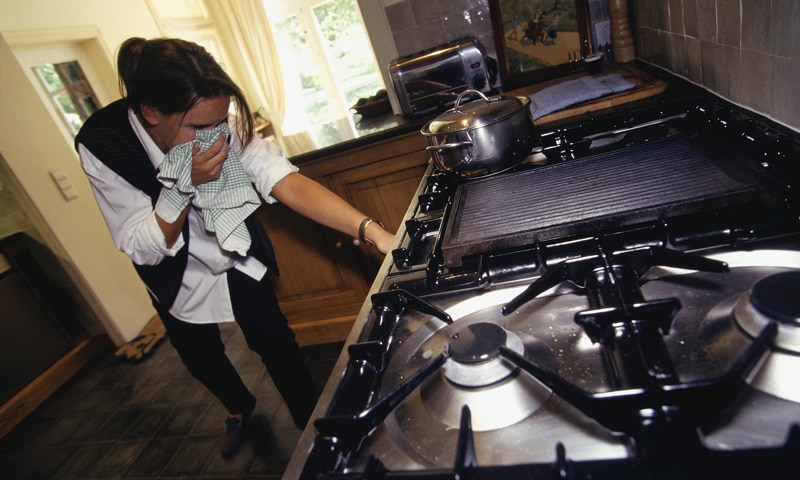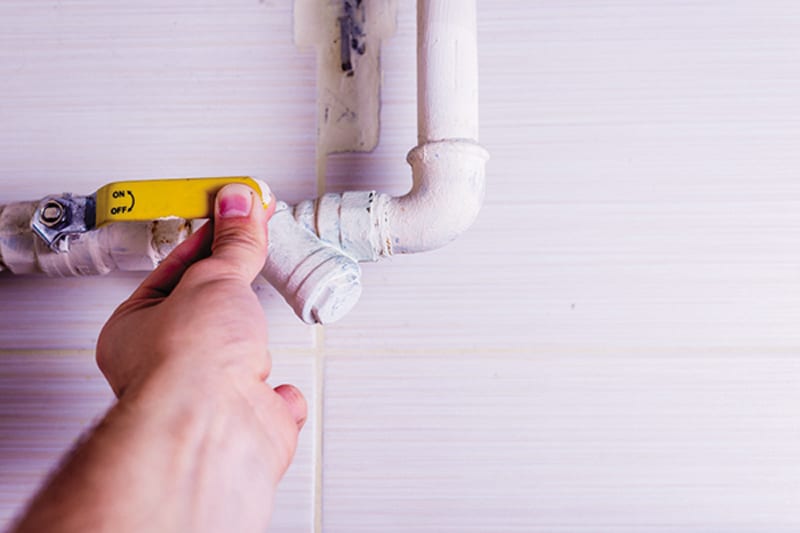It’s never a good thing to smell natural gas. The first thing you usually think is, “Leak!”
Which is not a surprising thing to think. The smell of natural gas is meant to trigger a signal for you to proceed with caution and possibly call the gas company to inform them there may be an issue. Worst case, you call 9-1-1.
It’s especially alarming if you think you’re smelling it in and around your house. Say from the water heater in the garage.
But if you’re smelling gas near your stove, that’s a whole other matter. You can’t just open up the garage and let it air out while you figure out what’s going on.
No, if you’re smelling gas from your stove in your own home, that is something that requires immediate attention. And here are the steps to follow in such a case.
1. Ensure You Know the Smell of Natural Gas
First things first: are you actually smelling natural gas?
You might not think that’s a reasonable question to ask, but natural gas is naturally odorless. To ensure you and everyone else smells gas, an additive called mercaptan is added to gas to give it an odor that makes it easier to detect a leak.
What does that additive smell like?
Well, most people think it smells like rotten eggs. You can smell it briefly when you ignite a burner on your stove. Just before the flame catches, you’ll be able to detect a whiff of the pungent odor.
So, if you’re not smelling rotten eggs, it’s not gas you’re smelling. Not sure what it might be, but it definitely isn’t gas.
However, if it is the scent of rotten eggs you’re consistently smelling, then it is gas. And if you’re not actively using the stove at that moment but smelling it, move on to step two.
2. Don’t Panic
This might sound obvious and easy to say when you don’t normally smell gas. You might think, “Of course I wouldn’t panic.”
However, when real life comes knocking and you’re smelling gas in your house, it’s easy to slip into some pseudo-panic as you try to figure out what you should do now.
That’s why step two is here. The important thing is not to panic. The good thing is you’ve detected the gas before it could fill up your house or set off your carbon monoxide alarm (which it won’t, since CO alarms don’t tend to detect natural gas). Or worse, make anyone sick from breathing too much of it.
You have time to take the steps you should in a relatively calm and efficient manner. That’s a good thing.
So, don’t panic and move on to step three.
3. Don’t Worry About Investigating Where the Leak is Coming From
Even if you’re sure the smell of gas is coming from your stove, don’t decide to play devil’s advocate and investigate any other sources of gas that may be the culprit. The bottom line is you already smell gas in your home. Unless you left a knob turned short of IGNITE, it’s time to take action.
Tip: if you smell gas around your stove, do check to make sure all the knobs are secured. If they are, keep reading.
You’ve already smelled it in and around your stove and all the knobs are off, great. Yes, maybe the pilot light has just gone out and you’re sure you can take care of it. That’s fine. But first you still have to deal with the gas already in the house that isn’t due to the human error of operating a knob wrong.
Note: most pilot lights have a safety valve that shuts when extinguished to prevent gas leaking. Sometimes they fail.
And don’t be tempted to pull the stove out and secure the gas cut-out that may be behind it. Why? Well, if the gas leak is coming from the gas line going to the stove, you might make a small leak a bigger leak, moving the stove. In addition, you don’t want to move anything that might inadvertently cause a spark.
Just face the fact you have gas in your home. Whether it’s coming from the stove or not doesn’t matter. It’s there. Time to deal with what you need to do to make your home safe until you can get your home free of gas invasion. This is where you proceed to step four.

4. Secure Any Open Flames
This is why you shouldn’t be panicking or chasing down alternate sources of a possible leak. Open flames plus gas are not a marriage made in heaven.
No, rather than play gas detective, start putting out any open flames.
Now, you might not have any and can skip this step. But remember, if you’re currently using the stove, turn your burners off. Using the oven? Shut it down. Got a scented candle going to try and mask the smell of rotten eggs? Blow it out.
If you’ve got a nice fire going in the fireplace, it’s understandable if it’s hard to put it out with the snap of your fingers if it’s a natural wood burning fire. But you can secure the fireplace doors. And if it’s a gas fireplace, turn it off.
Now that that’s all done, march to step five.
Tip: make a list of stuff in your house that uses flames as part of its function. Think of it as a circuit breaker panel of fire.
5. Open Windows and Doors
Now that the threat of open flames is taken care of, this is where you move on to naturally ventilating the house. This is easy, of course. Just go around and start opening every window and door you can in the vicinity of the kitchen area. The gas will follow the path of least resistance to the outside air.
Yes, there will still be lingering gas. And yes, there is still a leak, so new gas is replacing the old. But, because the windows and doors are open now, the new gas will, too, follow the old, keeping the house’s air more clear than it was with everything closed.
Also, if you have ceiling fans on, leave them on. If they’re off, leave them off. The reason is you don’t want to energize any new electrical item because of an abundance of safety. No reason to cause a possible electrical spark if you don’t have to.
Clearing the air by opening the windows and doors will also allow other people in the house to breathe easier. Which leads to step six.
6. Get Everyone in the House Out
Okay, you know it’s gas you keep smelling from the stove. You haven’t panicked. You didn’t go looking for alternative sources of gas. You extinguished any open flame. And you opened the windows and doors to let fresh air in and the gas out.
Now get everyone out of the house. This is a simple safety precaution until the problem can be identified and dealt with. And keep people from getting sick from breathing natural gas.
Again, don’t panic. Do this calmly and assuredly. Ease them out without trying to explain what’s going on until they’re actually out of the house. Explain to them not to flip and switch as they leave. Just lead them to the fresh air outside. Once outside, feel free to inform them of what’s going on.
But first, you may want to complete step seven.
7. Shut-Off the Main Cut-Off Valve to Your House
Now this isn’t exactly a required step, however, it sure as heck won’t hurt. Plus, it provides total peace of mind because once you shut that cut-off valve (usually right at the gas meter), you know no more gas is going into your home at all.
Unless there’s an issue with the valve. Which is why you do step eight no matter what.

8. Contact Your Gas Utility Company
Now it would be downright silly to go through all this and not contact the party responsible for providing this service to your house. Or not informing them if there’s an issue that needs addressing which involves their product.
This doesn’t mean they’re going to fix your stove. What they will do is a safety inspection. First they’ll check the main line to the house for any issues. Then they’ll probably pressurize the system to check for leaks internally.
If they find a leak on the stove (or any other gas appliance), they may hang a Red Tag on it. This will indicate the issue with the stove, in this case, and the necessary repairs. From there, they’ll probably secure gas access to the stove.
It is now on you to get the repairs done before gas is restored to the stove.
However, if it was just a pilot light that had gone out, the gas company will probably relight it for you, double check that it’s safe, and let you return to the rest of your day.
Yes, this will probably entail some time without the use of your stove. However, you weren’t going to use it with a leak, right?
Conclusion
The smell of gas near your stove isn’t necessarily an emergency. It also doesn’t mean you don’t have a problem that requires expedited address.
When natural gas is smelled, it needs to be addressed immediately, calmly, and assuredly. Even if it is a simple fix, knowing what to do can prevent what could be a small problem from becoming an explosive one.







